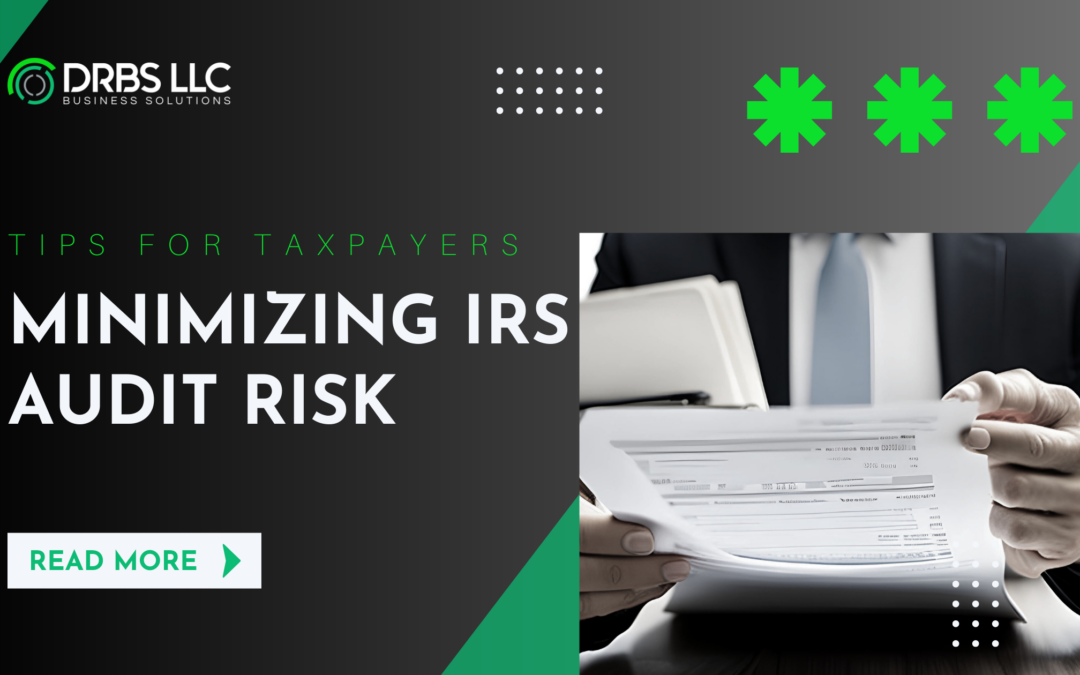Every taxpayer dreams of avoiding the dreaded IRS audit. While audits may seem like an uncontrollable aspect of the tax system, there are proactive steps individuals and businesses can take to reduce the likelihood of being selected for scrutiny. Maintaining accurate records, seeking professional advice, and adhering to tax regulations are among the essential strategies to minimize the risk of an audit. In this blog post, we will explore actionable tips that can help you stay off the IRS radar while maintaining financial integrity. Now, lets talk about some ways to minimize your IRS audit risk:
Maintain Accurate Records

One of the fundamental ways to minimize the risk of an IRS audit is to keep meticulous and well-organized records of all financial transactions and business activities. Proper record-keeping ensures that you can substantiate all the income and deductions claimed on your tax return. This includes keeping receipts, invoices, bank statements, payroll records, and any other relevant documentation. With digital tools and software available today, it has become more accessible than ever to maintain accurate records.
Consult with Professionals

Navigating the complex world of taxes requires expertise and knowledge that goes beyond the average taxpayer’s scope. Working with experienced accountants and tax professionals can provide you with invaluable advice on tax planning and compliance. They can help you identify potential red flags and implement strategies that align with the tax laws, minimizing the chances of an audit.
File Timely and Accurate Returns

Filing your tax returns on time and with accurate information is crucial in avoiding unwanted attention from the IRS. Late filings or errors on your return could raise suspicions, making your tax return more likely to be flagged for review. Use reputable tax software or seek professional assistance to ensure accurate and timely filing.
Reasonable Officer Salaries

For businesses, especially small ones, it’s essential to pay yourself and any other officers a reasonable salary based on job responsibilities and industry standards. The IRS may closely scrutinize companies that try to avoid payroll taxes by classifying workers as independent contractors or paying unreasonably low salaries to officers.
Be Transparent

Another one… honesty and transparency… in reporting your income and deductions are paramount. Disclose all relevant information and avoid understating or overstating your income or expenses. Failing to report income accurately or inflating deductions can trigger an audit and potentially lead to penalties or further investigations.
Avoid Abusive Tax Shelters

Also, stay away from dubious tax schemes that promise unrealistically large deductions or tax benefits. Engaging in such abusive tax shelters could attract IRS scrutiny and significant financial consequences. If something seems too good to be true, it probably is.
Review Returns Thoroughly

Last, but not limited to, before submitting your tax return, take the time to thoroughly review all the information provided. Check for any errors, inconsistencies, or missing data. The IRS has advanced systems to identify common mistakes, and correcting them beforehand can save you from unnecessary audits.
To Sum Things Up…
While nobody can guarantee complete immunity from an IRS audit, following these tips can significantly reduce the likelihood of being selected for review. Maintaining accurate records, seeking professional advice, and adhering to tax regulations are key pillars in minimizing your audit risk. Remember, should you find yourself facing an audit, remain calm, cooperate fully with the IRS, and seek professional representation to navigate the process effectively. By adopting proactive and responsible tax practices, you can promote financial integrity and enjoy greater peace of mind during tax season.


Recent Comments